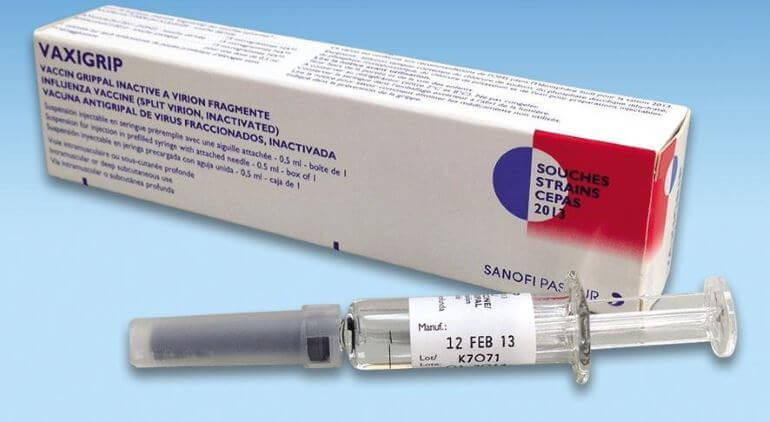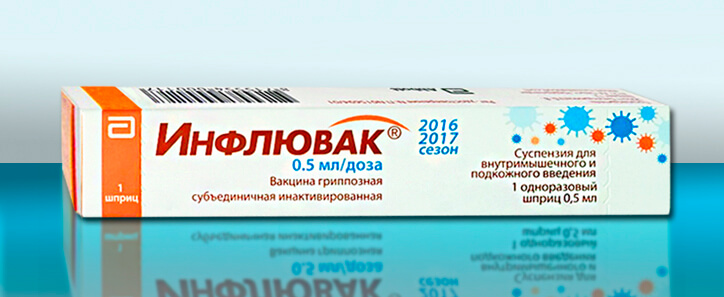The most effective prevention of colds (flu, acute respiratory viral infections (ARVI)) is vaccination .
Flu Prevention
Since 2006, by order of the Ministry of Health of the Russian Federation, influenza vaccination has been mandatory and has been included in the vaccination calendar of Russia. At the moment, vaccines of 4 generations are used in Russia - these are more than 20 varieties.
Every year, a certain type of vaccine is developed for each season. The composition of these vaccines introduces those strains of viruses (at least 3 strains) that will circulate during a period of increased incidence.
The main types of flu vaccines
- 1st generation vaccines.
 These vaccines are divided into live (contain a weakened virus) and inactivated (non-live). The live vaccine is Ultravac. Currently, this vaccine is rarely used. Grippovac can be attributed to representatives of the inactivated vaccine. The big disadvantage of these drugs is that they have many side effects. 2. Vaccines of the second generation.
These vaccines are divided into live (contain a weakened virus) and inactivated (non-live). The live vaccine is Ultravac. Currently, this vaccine is rarely used. Grippovac can be attributed to representatives of the inactivated vaccine. The big disadvantage of these drugs is that they have many side effects. 2. Vaccines of the second generation.

These are the so-called split vaccines. These include: Begrivak, Fluvaxin, Vaxigripp, Fluarix. They incorporate individual antigens of a microorganism (virus) with its external and internal proteins. The use of these vaccines carries with it a high percentage of side effects. 3. Vaccines of the 3rd generation - Agrippal, Influvac. As part of these vaccines, there is a certain amount of external antigens of influenza viruses and are maximally purified from protein, which ensures a high level of production of protective antibodies. The occurrence of side effects after the use of these drugs is much less compared with the use of previous vaccines (first and second generations). 4. Vaccines of the fourth generation. These are the so-called adjuvant preparations, which contain not only highly purified influenza virus antigens, but also an additional substance - an adjuvant. An adjuvant is a substance that influences the formation of an immune response, enhances it, when administered together with an immunogen. The following vaccines are approved for use in Russia: Grippol plus and Grippol. These vaccines are the most commonly used because they are well tolerated by children and adults.
As part of these vaccines, there is a certain amount of external antigens of influenza viruses and are maximally purified from protein, which ensures a high level of production of protective antibodies. The occurrence of side effects after the use of these drugs is much less compared with the use of previous vaccines (first and second generations). 4. Vaccines of the fourth generation. These are the so-called adjuvant preparations, which contain not only highly purified influenza virus antigens, but also an additional substance - an adjuvant. An adjuvant is a substance that influences the formation of an immune response, enhances it, when administered together with an immunogen. The following vaccines are approved for use in Russia: Grippol plus and Grippol. These vaccines are the most commonly used because they are well tolerated by children and adults.
It has now been determined that third and fourth generation vaccines are the safest and most effective. With their use, there are rarely complications, side reactions and effects. Keep in mind that vaccination cannot guarantee 100% protection against influenza. Protective antibodies after vaccination are produced only in 75-92% of vaccinated people. It is connected with this that people who are vaccinated can get sick with the flu, but the disease will proceed in a mild form.
Vaccination against SARS and influenza has a significant effect on reducing the incidence rate, reduces the risk of severe and dangerous complications, deaths, facilitates the course of the disease and leads to a decrease in the severity of the disease.
Who is required to be vaccinated
The following specific risk groups are distinguished, which are annually subject to specific prevention of influenza and SARS: babies from 6 months of age; preschoolers; schoolchildren of all grades (grades 1-11), as well as students of universities and students of institutions of secondary specialized vocational education; elderly people (especially over 60 years old); people with professions that are associated with numerous contacts (medical workers, people working in educational institutions, in the service and transport sectors). In addition, a flu shot is recommended for people who have chronic somatic diseases; people who are often ill with colds, military contingents.
Contraindications
Influenza vaccination is contraindicated in the initial (acute) period of ARVI or influenza; at elevated temperature (more than 37 degrees); people who have had the flu (vaccination is possible after 3 months from recovery); babies up to 6 months of age; people who have an individual intolerance to some of the components that are part of the vaccine; people who have previously experienced allergic reactions to influenza vaccination; people with blood diseases.
PS If you liked the article, please press the buttons of social networks.

Leave a comment